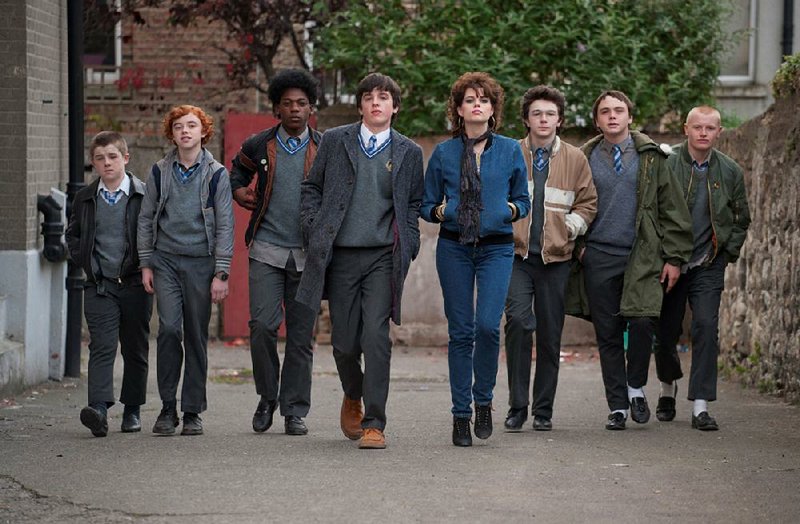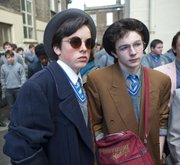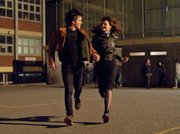No filmmaker has been more dedicated to revitalizing the contemporary performance-based musical film than John Carney. In the tiny chamber piece Once, and the larger orchestral work Begin Again, he explored the ways in which we find or free ourselves, grow, heal or connect through music.
The Irish writer-director continues on that track with Sing Street, taking an autobiographical turn with a fictionalized version of his teen years in depressed mid-1980s Dublin. A rite-of-passage romance wrapped in a let's-make-a-band scenario, the disarming film colors its social realism with the kind of wish-fulfillment fantasy often found in a four-minute music video.
Sing Street
87 Cast: Ferdia Walsh-Peelo, Lucy Boynton, Maria Doyle Kennedy, Aiden Gillen, Jack Reynor, Kelly Thornton, Ben Carolan, Mark McKenna, Percy Chamburuka, Conor Hamilton, Karl Rice, Ian Kenny, Don Wycherley, Lydia McGuinness
Director: John Carney
Rating: PG-13, for thematic elements including strong language and some bullying behavior, a suggestive image, drug material and teen smoking
Running time: 106 minutes
The visual promo tool of music videos enjoyed one of its most explosive creative booms with the British pop artists of that decade. New Romantic playboys wearing guyliner and extravagant quiffs, mops or mullets strutted about in flouncy wardrobes, surrounded by harems of supermodel types with legs that went on forever. That sort of escapism, along with the synth-pop and new wave sounds of the era, give the young hero of Carney's film something to which he can aspire. It also allows for a generous selection of classic '80s hits on the soundtrack, alongside original songs.
The action takes place in 1985, when Dublin was hit hard economically and the Irish were heading in droves to London in search of work. Times are tough also for the once-comfortable family of 14-year-old Conor (appealing newcomer Ferdia Walsh-Peelo). Commissions have slowed for his architect father, Robert (Aidan Gillen), while his mother, Penny (Maria Doyle Kennedy), has been cut back to part-time employment. Adding to the financial pinch, their marriage is in trouble in a country where divorce is still prohibited.
While eldest son Brendan (Jack Reynor) has conveniently dropped out of college, the family needs to cut expenses by pulling Conor out of his posh Jesuit school and putting him in the state-run Christian Brothers school on Synge Street. That transition into a rough new environment is conveyed in zippy early scenes in which Conor dodges brawling playground thugs, a sneering bully and even a hurled rat. The authoritarian Brother Baxter (Don Wycherley) also gives him hell for not wearing regulation black shoes, which his parents can't afford. He seeks solace by watching Top of the Pops with music buff Brendan.
Conor finds a school friend in Darren (Ben Carolan), a carrot-top pipsqueak who fancies himself a business entrepreneur. When Conor works up the courage to approach Raphina (Lucy Boynton), a beautiful but rootless girl a year or two older who hopes to leave for London to pursue modeling, he offers to put her in his music video. But he has neither a band nor a song, so Darren steps up to pull it all together.
In this aspect, Sing Street inevitably recalls the 1991 Dublin-set hit The Commitments, a connection reinforced by casting that film's dark-haired beauty, Doyle Kennedy, as Conor's mum.
Assembling the band proves easy. Multi-instrumentalist Eamon (Mark McKenna) brings musicianship and songwriting skills to go with Conor's lyrics; the one black guy in school (Percy Chamburuka), seems a cred requirement, and he happens to play keyboard; and the bass and drum players sign up after seeing a bulletin board flier. They call themselves Sing Street, a play on the school's address.
The young nonprofessional actors are a fresh, natural bunch, even if the band members might have benefited from more individual character development. However, there's a fun sight gag that has the gawky group exiting in slow motion from Eamon's shed after an early meeting, suddenly adopting a too-cool-for-school swagger.
Their songs, written by Carney with pop veteran Gary Clark (one-time frontman of late-'80s Scottish band Danny Wilson, which spawned the hit "Mary's Prayer"), are clever pastiches of tracks by the big acts of the time: Duran Duran, A-ha, Spandau Ballet, etc. The group's first effort, "The Riddle of the Model," is just flattering and catchy enough to persuade Raphina to star in their hilariously scrappy video, as well as do makeup.
That also yields a funny running gag as Conor starts experimenting with new looks, turning up at school restyled as Nick Rhodes, Robert Smith or Tony Hadley, guises that give him the self-confidence to stand up to lunkhead bully Barry (Ian Kenny). It doesn't go over so well with Brother Baxter, however, who violently scrubs off Conor's makeup, hissing, "No more Ziggy Stardust!"
Because the formula demands a public performance deadline, Sing Street starts preparing to play the End-of-Term Disco. A once decent guitar player who was too unmotivated to pursue it, Brendan begins living vicariously by taking Conor's musical education in hand. He expands his little brother's influences, teaches him that rock 'n' roll requires risk and gives him pointers in his quest to woo Raphina. Those scenes are among the movie's best, thanks in large part to the low-key stoner humor and warm fraternal affection displayed by Reynor's Brendan.
As the band builds up its repertoire, the various (mostly abortive) video shoots are consistently amusing, making atmospheric use of Dublin locations, from grungy streets to the sleepy port. They peak with a marvelous fantasy interlude in which a dismal rehearsal blossoms in Conor's mind into a Back to the Future-inspired 1950s American prom scene. It's lavishly costumed, fully choreographed and incorporates idealized versions of all the problem figures in Conor's life -- from his now-divided parents to the detested Baxter. The song also is a blast, an ersatz Hall & Oates number with a dash of Huey Lewis and the News called "Drive It Like You Stole It."
But Sing Street's miraculous musical evolution (Carney winks unapologetically in songs that seem to hatch fully formed, as perfectly arranged nuggets) takes a backseat to the film's more standard-issue romantic core. Conor's pining for the mostly elusive Raphina isn't half as much fun as watching him make music, though there's plenty of sweet chemistry between them.
Compared to, say, Begin Again, this is perhaps not the most sophisticated storytelling, and the transitions between the narrative's parallel threads could be smoother. But there's an infectious joyousness to the movie, right down to its fanciful fairy tale ending.
MovieStyle on 05/13/2016


